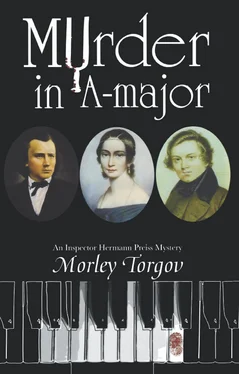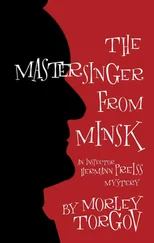Morley Torgov - Murder in A-Major
Здесь есть возможность читать онлайн «Morley Torgov - Murder in A-Major» весь текст электронной книги совершенно бесплатно (целиком полную версию без сокращений). В некоторых случаях можно слушать аудио, скачать через торрент в формате fb2 и присутствует краткое содержание. Жанр: Исторический детектив, на английском языке. Описание произведения, (предисловие) а так же отзывы посетителей доступны на портале библиотеки ЛибКат.
- Название:Murder in A-Major
- Автор:
- Жанр:
- Год:неизвестен
- ISBN:нет данных
- Рейтинг книги:5 / 5. Голосов: 1
-
Избранное:Добавить в избранное
- Отзывы:
-
Ваша оценка:
- 100
- 1
- 2
- 3
- 4
- 5
Murder in A-Major: краткое содержание, описание и аннотация
Предлагаем к чтению аннотацию, описание, краткое содержание или предисловие (зависит от того, что написал сам автор книги «Murder in A-Major»). Если вы не нашли необходимую информацию о книге — напишите в комментариях, мы постараемся отыскать её.
Murder in A-Major — читать онлайн бесплатно полную книгу (весь текст) целиком
Ниже представлен текст книги, разбитый по страницам. Система сохранения места последней прочитанной страницы, позволяет с удобством читать онлайн бесплатно книгу «Murder in A-Major», без необходимости каждый раз заново искать на чём Вы остановились. Поставьте закладку, и сможете в любой момент перейти на страницу, на которой закончили чтение.
Интервал:
Закладка:
Worst of all, Düsseldorfs critics-while generous as usual in praising Clara Schumann's virtuosity-now unanimously called for Robert Schumann to do the right thing by the Düsseldorf Symphony Orchestra and step down as its principal conductor. The most outspoken critic on this point, Gustav Jansen, pointed out that what had once been one of the country's finest musical ensembles was being reduced under Schumann's leader-ship to an orchestra of only modest abilities. “I appeal to Dr. Julius Illing, as Chairman of the Music Society of Düsseldorf, to take action,” wrote Jansen, “before the situation further deteriorates. Perhaps Maestro Schumann might henceforth occupy the honourary position of Conductor Emeritus…”
I thought: how terrible the life of the creative artist…to be stripped and stretched without pity on the rack of public opinion. Then, thinking this, I realized that I was trapped, hopelessly trapped. Trapped by him. And trapped by her.
Chapter Seven
Georg Adelmann and I sat down to lunch at Emmerich's Restaurant des Artistes at noon on the day after the concert. As I feared, Dr. Adelmann possessed expensive tastes in food and drink. Presented with the wine list, he reverentially recited the contents, stopping abruptly at a particularly costly vintage. “Ah yes,” he exulted, “a ’29 Burgundy! One of the better years. Splendid! You know, Preiss, a good Burgundy begs for roasted goose, doesn't it.” Which is what he ordered, explaining that he habitually ate only one meal daily and therefore preferred that it be copious. This disclosure became all the more ominous thanks to a fawning headwaiter who profusely congratulated Adelmann on his admirable choices while cautioning him to save room for a cheese platter and dessert.
“Somehow, I'm not at all startled by this dreadful turn of events in Schumann's career,” Adelmann said. As he spoke, minuscule bits of the pickled beets that he'd ordered as an appetizer flew from his busy lips, landing on the white expanse of tablecloth between us, leaving the once pristine space spotted as if from smallpox. I made a mental note to keep a safe distance from the man throughout the meal. “You see,” Adelmann went on, “from the very moment of his conception in 1809, indeed even before that time, the Schumann family was star-crossed. Strange, but some bloodlines seem to have a natural talent for collecting bad luck. They have a kind of magnetism, like lodestone, but unfortunately what they attract more often than not is misery.”
“You mean Schumann was born into poverty?” I said.
“On the contrary,” Adelmann said, “his father and his uncle had established a rather profitable book publishing business in Zwickau-”
I dropped my fork. “Did you say Zwickau, Dr. Adelmann?”
“Yes. In Saxony. You're familiar with the town?”
“Of course. As a matter of fact, I was born nearby. A small town called Zwicken.”
Adelmann sniffed the air. “Zwicken? Zwicken? Never heard of it. I assume, sir, that you were fortunate enough to spend your childhood in a more civilized part of the country. At any rate, Schumann's father was an extremely sickly man, but a man of some considerable literary accomplishment. Wrote a dozen or more books, mostly about mythology. By the time young Schumann was old enough to attend school, the family was enjoying some affluence.”
“What about Schumann's mother?”
“She was the daughter of a doctor. When Schumann's father, August, wanted to marry Johanne Schnabel-that was her maiden name-the girl's father gave August a hard time. Insisted the young man get into business first. Put a lot of stress on the poor fellow, which he never quite got over. Life-long stomach pains, sore limbs, headaches, that kind of thing. Not unlike the current situation with Robert and Clara. Strange how history repeats itself, eh, Preiss?”
“How so?” I said.
“No doubt you've heard of the notorious Professor Friedrich Wieck, Clara Schumann's father?”
“Only that he is a piano teacher of some importance. I never heard him referred to as notorious.”
“Then let me set you straight, Preiss. A dreadful human being, that's the best one can say for Wieck. Did his utmost to make Schumann's life miserable. Schumann was a pupil of his, but his playing ability was somewhat hampered by a small right hand. So Wieck devised some sort of stretching apparatus to apply to young Schumann's hand. Pure torture, and in the end not worth a damn. Ruined Schumann's chances for a career as a concert pianist. And as though that wasn't enough, Papa Wieck bitterly opposed his daughter's pending marriage to the seemingly luckless Schumann. Even went so far as to force a court battle over the issue. Lost, of course, and ever since then the acrimony between the two men has been thick enough to chop with a butcher's cleaver.”
“You started to tell me about Schumann's mother,” I said.
“Ah, yes. Again, history repeats itself. She gave birth to five…or was it six?…children in short order. Robert was the youngest. Poor woman spent much of her life, even when times were relatively good, in the shadows of chronic melancholy. Young Robert was the child she felt closest to, especially because at a young age he displayed exceptional musical talent. At the age of seven, he began music lessons with a church organist in Zwickau. No doubt about it, Preiss, the man you and I witnessed going to pieces before our very eyes last night in the concert hall was once upon a time a very gifted child.”
“Then when did Schumann's life take a wrong turn?” I said. “Look, Dr. Adelmann, many men and women blessed with innate talents run headlong into adversity, but they manage to overcome, even to triumph. Take Beethoven, for instance. He became a legendary figure despite becoming stone deaf. My God, he wrote the great Choral Ninth when he couldn't hear a single note of the piece.”
“Ah yes, Inspector-” Here, Dr. Adelmann jabbed his knife in the air to make a point. “But, there are some-and I am one of them-who will go to their graves maintaining that Beethoven's Ninth-the choral part, that is-was a tragic mistake.”
I stared at Adelmann as if he'd just uttered heresy.
“You see, Preiss, the piece is barely singable. It was written at least one whole tone too high. Next time you have an opportunity to hear the piece, listen carefully. If you can prove me wrong, I, Georg Adelmann, will deliver to your doorstep an entire case of Germany's best Moselle. The trouble with Beethoven is that he didn't know when it was time to quit.”
“And it is your opinion that the same can be said of Robert Schumann?”
“Yes, absolutely. The man's a mess.”
“And you attribute this principally to his childhood, then?”
Adelmann suddenly laid down his knife and fork. “If you will forgive my saying so, Inspector, I don't quite see how your inquisitiveness about Robert Schumann's childhood is germane to the purpose of this conversation. As I understood it, you wanted to know more about the man as a full-fledged composer so that your friend Miss Becker might-as you put it-better understand the Cello Concerto.”
There was a hint of suspicion in his eyes, something I was not accustomed to. (As a detective, it was I who gave people suspicious looks, not the other way around.) “Please pardon the insatiable curiosity of a policeman, Dr. Adelmann,” I said. “Interrogation is in my blood. My life is punctuated by question marks.”
Still eyeing me with some skepticism, Adelmann said, “I don't know why it is, Inspector, but I have this strange feeling that your mission-how can I put it delicately? — has less to do with your friend's interest in Schumann's concerto and more to do with…” Here my guest hesitated for a moment. Lowering his voice, he said, “More to do with these tales about the Schumanns themselves.”
Читать дальшеИнтервал:
Закладка:
Похожие книги на «Murder in A-Major»
Представляем Вашему вниманию похожие книги на «Murder in A-Major» списком для выбора. Мы отобрали схожую по названию и смыслу литературу в надежде предоставить читателям больше вариантов отыскать новые, интересные, ещё непрочитанные произведения.
Обсуждение, отзывы о книге «Murder in A-Major» и просто собственные мнения читателей. Оставьте ваши комментарии, напишите, что Вы думаете о произведении, его смысле или главных героях. Укажите что конкретно понравилось, а что нет, и почему Вы так считаете.












